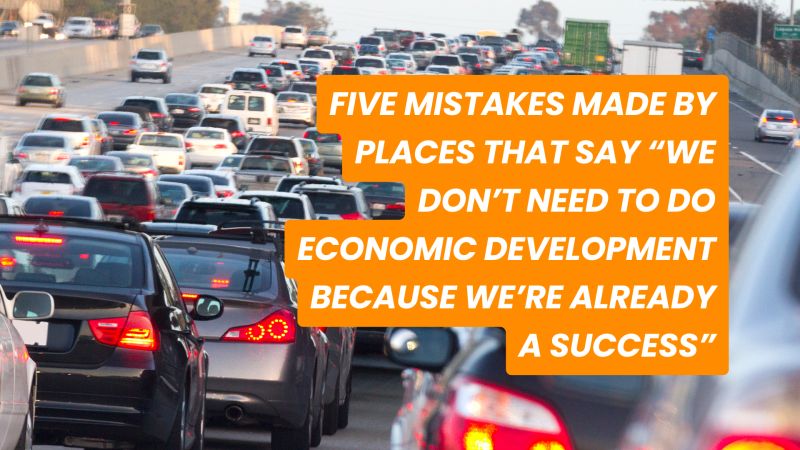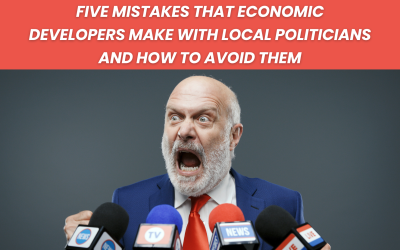Successful places need an economic development strategy as much as unsuccessful ones.
Here’s 5 mistakes that successful places make:
𝗠𝗶𝘀𝘁𝗮𝗸𝗲 #𝟭: 𝘀𝘂𝗰𝗰𝗲𝘀𝘀 𝗱𝗼𝗲𝘀𝗻’𝘁 𝗺𝗲𝗮𝗻 𝗶𝘁𝘀 𝘀𝗵𝗮𝗿𝗲𝗱. I live in a tech town. Sure its successful if you are a tech worker, but not if you are in a job requiring low skills and on low pay. It is very expensive to live here, and the gulf between low skills attainment and the qualifications requirements of a tech job are very wide. Successful places need hospital workers, emergency services, maintenance crews, teachers, childcare workers and baristas in order to maintain their basic services. So if you claim to be a success – are you really a success for all of your residents? if not, you’ve still got work to do.
𝗠𝗶𝘀𝘁𝗮𝗸𝗲 #𝟮: 𝗮𝘀𝘀𝘂𝗺𝗶𝗻𝗴 𝘁𝗵𝗮𝘁 𝘁𝗵𝗶𝗻𝗴𝘀 𝗻𝗲𝘃𝗲𝗿 𝗰𝗵𝗮𝗻𝗴𝗲. The economy is dynamic, new technologies emerge, old trading relationships get radically upended, immigration policies reduce the supply of essential workers for your local industries, financial crises reduce the investment capital available… are you aware of how this will affect your local economy? are you ready to act?
𝗠𝗶𝘀𝘁𝗮𝗸𝗲 #𝟯: 𝗻𝗼𝘁 𝘁𝗮𝗸𝗶𝗻𝗴 𝗰𝗮𝗿𝗲 𝗼𝗳 𝗰𝗼𝗺𝗽𝗲𝘁𝗶𝘁𝗶𝘃𝗲 𝗽𝗹𝗮𝗰𝗲 𝗮𝗻𝗱 𝗾𝘂𝗮𝗹𝗶𝘁𝘆 𝗼𝗳 𝗽𝗹𝗮𝗰𝗲. I know of entire counties in the Greater South East of England with less than 20 hectares of ready-to-occupy employment land and vacancy rates under 5% for Grade A offices. And then there are the factors which attract workers in growth industries – great places to live and work, with cultural vibrancy, public services, sustainable transport, and a good choice of jobs.
𝗠𝗶𝘀𝘁𝗮𝗸𝗲 #𝟰: 𝗵𝗮𝘃𝗶𝗻𝗴 𝗻𝗼 𝗰𝗼𝗻𝗰𝗲𝗽𝘁 𝗼𝗳 𝗿𝗲𝗮𝗹 𝗶𝗻𝗰𝗼𝗺𝗲𝘀. Wealth is measured by what you can buy with your money, not levels of pay. Factors which depress real incomes such as living costs, accommodation, high transport costs will dampen success and growth rates.
𝗠𝗶𝘀𝘁𝗮𝗸𝗲 #𝟱: 𝗻𝗼𝘁 𝗮𝗰𝗰𝗼𝘂𝗻𝘁𝗶𝗻𝗴 𝗳𝗼𝗿 𝗲𝘅𝘁𝗲𝗿𝗻𝗮𝗹𝗶𝘁𝘆 𝗰𝗼𝘀𝘁𝘀. Successful places can get very busy and congested, which causes externality costs from delays, lengthened journey times, pollution and noise. These affect real incomes and can become factors in household and firm location decisions.
These are just a few of the mistakes I’ve seen made by places. The longer you leave them unaddressed the more challenging they will become.







